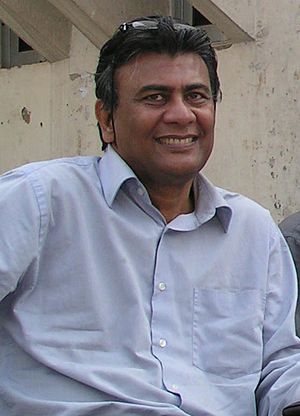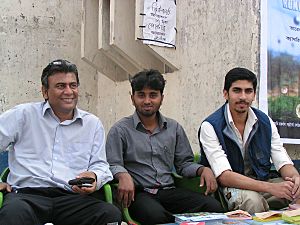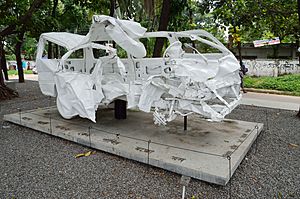Tareque Masud facts for kids
Quick facts for kids
Tareque Al Masud
|
|
|---|---|
| তারেক মাসুদ | |

Masud in Sylhet, December 2010
|
|
| Born |
Tarequer Masud
6 December 1956 |
| Died | 13 August 2011 (aged 54) Ghior Upazila, Manikganj, Bangladesh
|
| Resting place | Nurpur, Bhanga, Faridpur |
| Monuments | The Wreckage Microbus of Mishuk Munier and Tareque Masud |
| Nationality | Bangladeshi |
| Other names | Cinema Feriwalla |
| Education | MA |
| Alma mater | University of Dhaka |
| Occupation |
|
| Years active | 1995–2011 |
| Known for | Matir Moina |
|
Notable work
|
|
| Spouse(s) | Catherine Masud |
| Children | 1 |
| Awards | Ekushey Padak (2012) |
| Signature | |
Tareque Masud (born December 6, 1956 – died August 13, 2011) was a famous Bangladeshi film director. He was also a producer, writer, and lyricist. He became well-known for his films Muktir Gaan (1995) and Matir Moina (2002).
Matir Moina won three international awards. It received the International Critics' FIPRESCI Prize at the 2002 Cannes Film Festival. This film was also the first from Bangladesh to compete for an Academy Award for Best Foreign Language Film.
Sadly, Tareque Masud died in a car accident on August 13, 2011. He was returning from a filming location in Manikganj. At the time, he was working on a new film called Kagojer Phool (The Paper Flower).
In 2012, he received the Ekushey Padak after his death. This is the second highest award for civilians in Bangladesh. In 2013, New York University held a special event to show all of his films in North America.
Contents
Early Life and Education
Tareque Masud was born on December 6, 1956. His village was Nurpur in Faridpur District, Bangladesh. He spent his early years there and started school at an Islamic school called a madrasah. He studied there for eight years.
His education was stopped in 1971 by the Bangladesh Liberation War. After the war, he went to a regular school. He finished his higher secondary education at Notre Dame College, Dhaka. Later, he earned a master's degree in History from the University of Dhaka.
A Filmmaker's Journey
Tareque Masud loved films from his university days. He joined a film society and started his first film in 1982. This was Adam Surat (The Inner Strength), a documentary about the painter SM Sultan.
In 1995, he made a long documentary about the 1971 Liberation War. It was called Muktir Gaan (Song of Freedom). This film was very popular and became a classic. He also made other films about the war, like Muktir Kotha (Words of Freedom, 1999) and Narir Kotha (Women and War, 2000).
His film Matir Moina (The Clay Bird, 2002) was very special. It was based on his own childhood experiences in the madrasah. This film was shown at the Cannes Film Festival. It won an award for its real and touching story about a country fighting for its rights.
Champion of Independent Film
Tareque Masud helped start the independent film movement in Bangladesh. In 1986, he helped create the Bangladesh Short Film Forum. This group supports independent filmmakers.
In 1988, he organized the first International Short and Documentary Film Festival in Bangladesh. This festival still happens every two years. Tareque was also known as "Cinema Feriwalla." This means "Cinema Hawker." He earned this name because he traveled to small towns and villages. He used a mobile projector to show his films to people everywhere.
His wife, Catherine Masud, was an American-born film editor. She was his creative partner. They met while he was finishing Adam Surat. For the next 20 years, they made films together through their company, Audiovision. They wrote scripts, directed films, and traveled the world with their movies. Catherine also edited all their work.
Notable Films and Themes

Tareque Masud's first major film was Adam Surat (Inner Strength). It was completed in 1989. His documentary Muktir Gaan (The Song of Freedom, 1995) was also very famous. It followed a music group during the 1971 Liberation War. The group sang songs to inspire freedom fighters.
His first full-length feature film was Matir Moina ("The Clay Bird", 2002). It was shown at the Cannes Film Festival. He won the International Critic's Award for this film. Critics praised it for showing life in Bangladesh realistically, without too much drama.
His film Ontarjatra ("Homeland", 2006) was about Bangladeshis living in London. It showed their journey back to Bangladesh. His next film, Runway (2010), explored how strong religious teachings affected a young boy. Tareque Masud's last project was Kagojer Phool ("The Paper Flower"). This unfinished film was about the division of the Indian subcontinent. It was meant to be a story happening before Matir Moina.
Tareque Masud's films often explored similar ideas. These included conflicts between religion and society, stories with strong female characters, and a deep love for his country.
Personal Life
Tareque Masud and Catherine Shapere had one son. His name is Nishad Bingham Putra Masud.
His Passing
On August 13, 2011, Tareque Masud died in a road accident. It happened in Joka while he was returning to Dhaka from Manikganj. His microbus crashed head-on with a passenger bus. He and others were traveling to find locations for his new film, Kagojer Phool.
His long-time co-worker, Mishuk Munier, a cinematographer and CEO of ATN News, also died in the accident. Tareque's wife, Catherine, and four other people survived the crash. After his death, Catherine created the Tareque Masud Memorial Trust. This trust works to keep his films and ideas alive. It publishes books, runs educational projects, shows his films, and aims to finish their unfinished works.
Legacy and Awards
On December 6, 2018, Google Doodle honored Tareque Masud on its Bangladesh page. This was to celebrate his 62nd birthday.
Tareque Masud received many awards for his films. In 1996, he won the Best Film Award from the Bengal Film Journalists' Association Awards for Muktir Gaan. He also received a National Award for Documentary film in 1996.
For Matir Moina (2002), he won the International Critics' FIPRESCI Prize at the 2002 Cannes Film Festival. He also received the Best Screenplay Award from the International Film Festival of Marrakech in 2002. In 2003, Matir Moina won Best Film awards from the Bengal Film Journalists' Association Awards, Kara Film Festival, and Channel I Film Awards.
He continued to receive awards throughout his career. In 2012, he was given the Ekushey Padak after his death. This is the highest civilian award in Bangladesh. In 2013, New York University and South Asia Solidarity Initiative held a special event to show all his films in North America.
Filmography
| Year | Title | Credited as | Notes | Ref(s) | |||
|---|---|---|---|---|---|---|---|
| Director | Writer | Producer | Other | ||||
| 1985 | Shonar Beri | Yes | Yes | No | No | Documentary film | |
| 1989 | Adam Surat | Yes | No | Yes | No | Biogralhical documentary on SM Sultan | |
| 1992 | Unison | Yes | Yes | No | No | Animated documentary film | |
| 1993 | Shey | Yes | Yes | No | No | Documentary film Co-directed by Shameem Akhter |
|
| 1995 | Muktir Gaan | Yes | No | No | No | Documentary film footage filmed by Lear Levin |
|
| 1997 | Shishu Kantha | Yes | Yes | No | No | Documentary film | |
| 1999 | Nirapotter Namey | Yes | Yes | No | No | Documentary film | |
| 1999 | Muktir Kotha | Yes | No | No | No | Documentary film | |
| 2000 | Narir Kotha | Yes | Yes | Yes | No | Documentary film | |
| 2002 | Matir Moina | Yes | Yes | No | No | Co-written with Catherine Masud | |
| 2002 | A Kind of Childhood | Yes | Yes | No | No | Documentary film Co-directed with Catherine Masud |
|
| 2006 | Ontarjatra | Yes | Yes | No | No | Co-directed with Catherine Masud | |
| 2008 | Kansater Pothay | Yes | Yes | No | No | Documentary film Co-directed with Catherine Masud |
|
| 2009 | Noroshundor | Yes | Yes | No | No | Co-directed with Catherine Masud | |
| 2010 | Runway | Yes | Yes | No | Yes | Music director Co-directed with Catherine Masud |
|
| TBA | Kagojer Phul | No | Yes | No | No | an unfinished feature | |
See also
 In Spanish: Tareque Masud para niños
In Spanish: Tareque Masud para niños
- Artistic depictions of Bangladesh Liberation War
- Bengali cinema
- Cinema of Bangladesh
 | Toni Morrison |
 | Barack Obama |
 | Martin Luther King Jr. |
 | Ralph Bunche |


